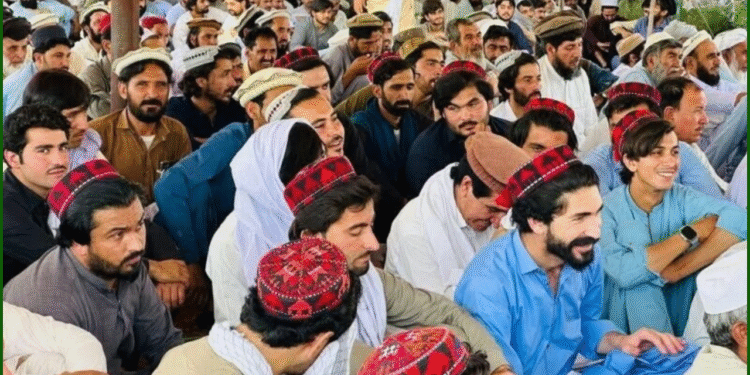Mir Ali, North Waziristan – For the fifth consecutive day, tribesmen in Mir Ali tehsil, North Waziristan, have maintained a sit-in protest following a devastating quad-copter strike that claimed the lives of four children and left their mother and other women critically injured. The attack, which occurred earlier this week in the Hormuz area, has sparked widespread anger and demands for justice among local communities.
The strike, which targeted a residential house, has drawn sharp criticism from local tribesmen and human rights advocates, who have labeled it a grave violation of civilian safety. Protesters have blocked major roads, bringing trade and transportation to a standstill, including vital Pak-Afghan trade routes. The disruption has left hundreds of trucks stranded, with perishable goods at risk and traders facing significant financial losses.
Local tribal leaders have accused security forces of involvement in the strike, a claim the military has firmly denied. In a statement released on May 19, the military described the accusations as part of a deliberate disinformation campaign aimed at undermining their counterterrorism efforts. The Inter-Services Public Relations (ISPR) attributed the attack to the banned Tehreek-e-Taliban Pakistan (TTP), referred to as “Fitna Al Khwarij,” alleging that the group is backed by foreign entities. The military emphasized that such acts exploit civilian areas to create division between locals and security forces.
In response to the growing unrest, the district administration has initiated dialogue with tribal leaders to seek a peaceful resolution. A traditional delegation, accompanied by symbolic gestures of reconciliation, including two goats and Sufi mediators, was sent to the protesters as part of a tribal custom known as nanawatey. In a gesture of goodwill, the sit-in organizers postponed a planned march to Islamabad until Monday, giving authorities time to address their demands. However, tribal spokesperson Mufti Baitullah warned that failure to meet these demands would prompt protesters to escalate their actions, including marching to the capital with the victims’ bodies.
The ongoing sit-in has intensified calls for transparency and accountability. Local residents have expressed frustration over the lack of clear information about the strike, demanding answers about its perpetrators and measures to prevent future civilian casualties. On social media, voices from the region and beyond have echoed these sentiments, urging stricter oversight of aerial operations to protect innocent lives.
District officials have confirmed that an investigation into the incident is underway, though specifics remain limited. Efforts to resolve the situation continue, with authorities emphasizing respect for tribal customs in their negotiations.
As the sit-in persists, the blockade’s economic toll grows, with traders reporting losses in the millions. The situation remains tense, with the community awaiting concrete action from the government to address their grievances and restore calm to the region.

















































